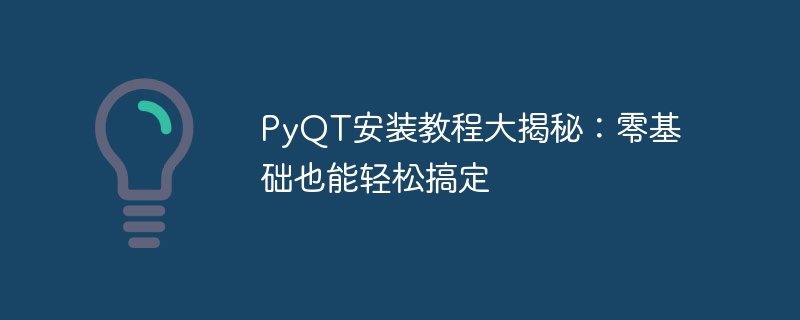

PyQT installation tutorial reveals: it can be easily done with zero foundation, specific code examples are needed
In the current era of technological development, the graphical user interface (GUI) is in the software plays a vital role in development. In order to develop beautiful and interactive program interfaces, we need to choose appropriate tools and frameworks. PyQT is a powerful GUI development tool that combines the simplicity of Python with the power of the QT framework, allowing developers to easily build excellent program interfaces.
However, for developers with zero foundation, the installation and use of PyQT may seem a bit difficult and complicated. Therefore, this article will share a PyQT installation tutorial to help zero-based developers easily install and use PyQT, and provide specific code examples for better understanding and mastery.
First, we need to ensure that the Python environment has been installed. If it is not installed yet, you can go to the Python official website to download and install the latest Python version. The installation process is very simple, just follow the prompts step by step.
Next, we need to install PyQT. Open a command line tool (such as cmd on Windows or terminal on Linux) and enter the following command:
pip install PyQt5
This command will automatically download and install the latest version of PyQT. During the installation process, you may encounter some dependency problems, which can be solved according to the prompts. After the installation is complete, we can confirm whether PyQT has been successfully installed through the following command:
python -c "import PyQt5"
If no error message is reported, PyQT has been successfully installed.
Next, we start writing the first PyQT program. First, create a Python file named test.py and enter the following code in the file:
import sys
from PyQt5.QtWidgets import QApplication, QLabel
if __name__ == '__main__':
app = QApplication(sys.argv)
label = QLabel("Hello, PyQT!")
label.show()
sys.exit(app.exec_())This code simply creates an application and displays a label in the window, A greeting appears on the label. We used two classes, QApplication and QLabel, in PyQT, which represent applications and labels respectively. The app.exec_() method represents the event loop that starts the application, while the sys.exit() method is used to ensure the normal destruction of the program when it exits.
Save and run this program, if everything goes well, a window will pop up showing the greeting we set.
Through this simple example, we can roughly understand the usage and basic concepts of PyQT. In actual development, more components and functions can be added as needed to build a richer and more complex interface.
In addition to basic GUI components, PyQT also provides many other functions and features, such as layout managers (Layouts), event handling (Event Handling), signals and slot mechanisms, etc. These are very important parts of PyQT development and are worth our time to learn and master.
Of course, if you want to truly become a master of PyQT, you need continuous practice and in-depth study. During the learning process, don’t be discouraged if you encounter problems. You can consult PyQT’s official documentation, tutorials and community, and you can also refer to the experiences and sharing of other developers.
To sum up, PyQT is a powerful and easy-to-use GUI development tool. For zero-based developers, the PyQT installation tutorial and specific code examples provided in this article can help you Easily install and use PyQT. I hope this article can be helpful to you, and I wish you make greater progress in your learning and development of PyQT!
The above is the detailed content of Big reveal: PyQT installation can be easily done with zero basic knowledge. For more information, please follow other related articles on the PHP Chinese website!




